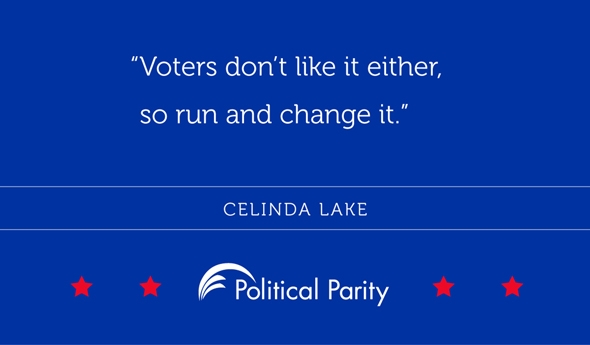She Talks Dirty: Money in Politics
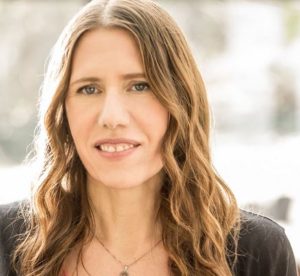 Part II of the “She’s More Than a Symbol” series with Marianne Schnall reflects on the all-encompassing impact of money on the political system in America. To be faced with raising an exorbitant sum of money before being taken seriously on the campaign trail is a substantial roadblock for even the most qualified candidates.
Part II of the “She’s More Than a Symbol” series with Marianne Schnall reflects on the all-encompassing impact of money on the political system in America. To be faced with raising an exorbitant sum of money before being taken seriously on the campaign trail is a substantial roadblock for even the most qualified candidates.
As I explored what stands in the way of more women entering politics and ultimately reaching the presidency, many people I spoke with during interviews for my book What Will It Take to Make a Woman President? referenced the financing of political campaigns. Both men and women identified it as one of the most significant contributors to the lack of women in political office. Political Parity’s research report, Shifting Gears, echoed these findings; 9 out of 10 women poised to run said that concerns about raising money mattered most as they considered campaigns for higher office.
Raising massive amounts of money has proven an even more daunting and challenging task for women than for their male counterparts. The Center for American Women in Politics (CAWP) found that women give less often to politics and in smaller dollar amounts than men. Incumbency also poses a particularly high hurdle for women in terms of fundraising, as 98% of all incumbents win their race and most incumbents are men. It’s much harder to raise viable campaign dollars if your race is considered a foregone conclusion. My interviewees shared invaluable insight into the financial challenges facing candidates and how to shift the existing power structure to benefit women.
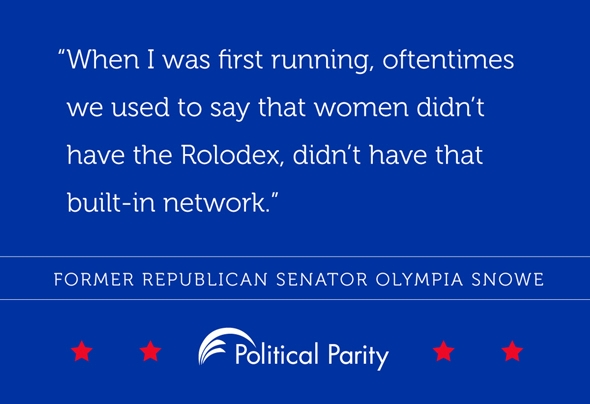
When asked what obstacles have kept women out of politics and the White House, Congresswoman Barbara Lee had this to say, “This [environment of] money and politics is obscene. We have to get the public financing of campaigns to level the playing field…it’s been a man’s world and so they have the access to the resources, in many ways, much more than women. So we’ve got to have a campaign finance system that really allows for equality.” These implications are borne out in recent research; according to Political Parity’s Twin States report, enacting clean elections and public financing laws were identified as two concrete actions that states can take that may help to facilitate electing more women to high-level political office.
Beyond systemic structural barriers, why is fundraising more of a challenge for women? Access to informal networks often present as much, if not more, of an impediment to women running. Former Republican Senator Olympia Snowe offered this insight: “When I was first running, oftentimes we used to say that women didn’t have the Rolodex, didn’t have that built-in network within either the communities or within a political party organization that would have been critical and indispensable to being a candidate for high public office. So, often men were in a position to have that network of support, both organizationally and financially. That made a huge difference; they could launch their candidacies and get the support of the power brokers in communities, or throughout the state, that became more of a natural alliance for men. But women did not have similar networks of support. They didn’t have…the access and the opportunities to run for public office.” This is still true today – most women remain outside the power centers for cultivating relationships, contacts and fundraising to be successful candidates. Exceptions do exist, of course. During the 2014 Congressional elections, Barbara Comstock proved herself a formidable fundraiser in her run for the 10th Congressional district of Virginia. She garnered widespread financial support to win her seat, raising more than $1.3 million from a donor list of high-powered and far-reaching contacts cultivated over many years in her business. Few candidates could access (or have built) such a list to call upon for support.
MSNBC host Melissa Harris-Perry described it this way: “Clearly the expense of running for office deters all kinds of newcomers and all kinds of people who have fewer institutional resources, and women continue to be poor in this country, on average and in general, more than men are. They have less access to capital, less access to the opportunities to raise the highest levels of capital, and it is almost unthinkably expensive to run. So part of it is that money tends to discourage newcomers and newcomers are going to be more likely to be women.”
Many people I interviewed agreed that in order for there to be more women in public office and the presidency, some real changes need to be made, including a more supportive campaign environment and campaign finance reform. As Democratic Leader Nancy Pelosi told me, “In order for us to really kick open the door, we have to change the environment we’re in. The environment I would like to see is one where the role of money is reduced and the level of civility is heightened. If you have less money and more civility, you will have more women. And that’s one of the reasons that we are pushing for campaign finance reform to reduce the role of money in politics. That’s what we have to do: create our own environment. We’ve been operating in an environment that has not been friendly to the advancement of women, especially now that it’s become so harsh and so money driven.”
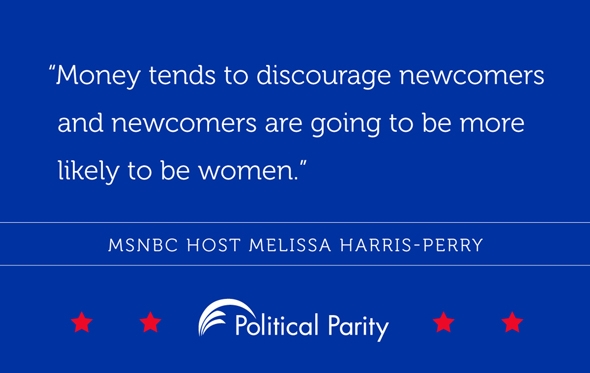
Pushing to change the value structure in political campaigns is critical to opening up opportunities for more women to run and win. But since the system won’t change overnight and money does currently play a crucial role in political campaigns, it’s important for voters to be aware of the inequities and unique challenges women candidates face. Voters need to show up in every way possible to support women candidates—including writing a check. As a timely indicator of what can happen when women’s collective power and potential are tapped, two recent articles by the Center for Responsive Politics and the Washington Post indicated that Hillary Clinton raised $47.5 million dollars during her first two and a half months as a presidential candidate, and of the more than 250,000 contributors who donated to her campaign, 61 percent were women. Clinton is an extraordinary example, but the principle still holds.
How can we provide women with access to networks of major donors and encourage women in their capacity to fundraise?
As renowned feminist activist Gloria Steinem explained, “Money, of course, is a big barrier, a huge barrier. I’ve raised money for candidates who, if I’m raising money for them, probably are all the same on the issues. But if I’m raising money for a man running for the Senate, someone will give me $1,000; if it’s a woman, they’ll give me $200 or $300. Not consciously, but unconsciously, as if women can get along on less or they’re ashamed to give a man less. We have to name that and be conscious of giving women candidates as much as we would a male candidate.”
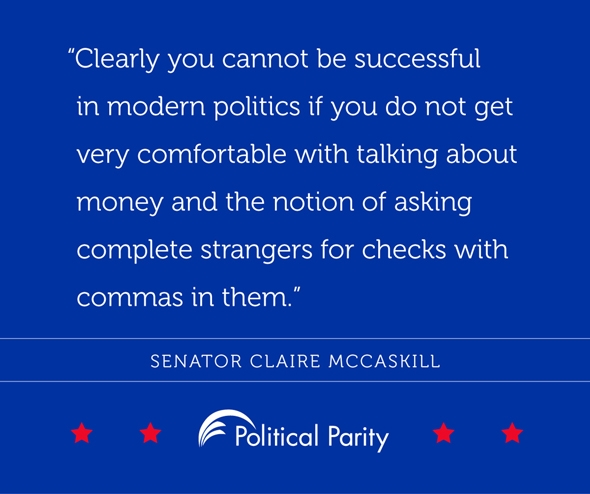
Senator Claire McCaskill reflected, “I was taught as a young girl that it was impolite to talk about money. I was taught that it’s not something you inquired about and that it would be a sign of failure if you needed to ask someone for money. Well, clearly you cannot be successful in modern politics if you do not get very comfortable with talking about money and the notion of asking complete strangers for checks with commas in them. This is as essential to success as breathing, especially in a race like president of the United States. And to get to be a candidate for president of the United States, you have to demonstrate your ability at other offices, and that obviously entails fundraising. So that skill was, and still is, [a factor]—whether it is the reluctance of women to be donors or the reluctance of women to ‘close’ on fundraising.”
Senator McCaskill also offered this powerful analogy about why it’s so important for other women to give financial support to women candidates: “We are naturally wired to be nurturers, protectors, and we see our security as really important. So spending money on a politician’s race, how does that get you security? That’s not tangible. That’s not like a savings account. It’s not an insurance policy. And so what women have to realize is that power is the ultimate security. Power brings about a much broader type of security for their children and for their grandchildren.” This thoughtful example is an ideal message when recruiting women donors.
The most valuable message from my interviews amounts to a call to action: we all have vital roles to play.
The most valuable message from my interviews amounts to a call to action: We all have vital roles to play in using our influence and raising our voices to advocate for a more level playing field and by financially supporting the women candidates we believe can enact that change.
As Celinda Lake, one of the Democratic Party’s leading political strategists, explained: more women should become candidates themselves and make those necessary changes from within: “Voters don’t like it either, so run and change it. Run and pass campaign finance reform. You don’t like raising the money? Voters don’t like the way the money’s being raised either. Run and change it. You can’t change it from the sidelines.”
